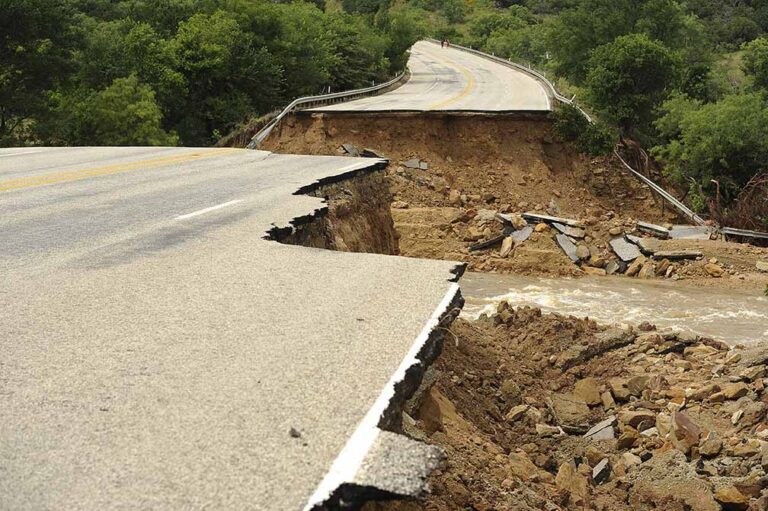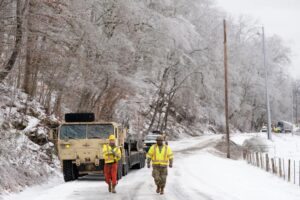WASHINGTON — The Biden-Harris Administration has announced nearly $830 million in grant awards for 80 projects nationwide that the White House says will help states and local communities save taxpayers money while strengthening surface-transportation systems and making them more resilient to extreme weather.
“These grants are the first of their kind dedicated to transportation infrastructure resilience and were made possible by President Biden’s Bipartisan Infrastructure Law’s Promoting Resilient Operations for Transformative, Efficient and Cost-saving Transportation (PROTECT) Discretionary Grant Program, which complements PROTECT Formula funding that is already flowing to states for these types of projects,” a news release states. “To strengthen America’s climate resilience, President Biden has secured more than $50 billion for climate resilience and adaptation through the Bipartisan Infrastructure Law and Inflation Reduction Act, and established a National Climate Resilience Framework, which is advancing locally tailored, community-driven climate resilience strategies.”
The government says that weather events are becoming more frequent and severe due to climate change and are causing increasing damage to the transportation system, which was primarily designed and built before the realities of the world’s current climate.
“Every community in America knows the impacts of climate change and extreme weather, including increasingly frequent heavy rain and flooding events across the country and sea-level rise that is inundating infrastructure in coastal states,” said FHWA Administrator Shailen Bhatt. “This investment from the Biden-Harris Administration will ensure our infrastructure is built to withstand more frequent and unpredictable extreme weather, which is vitally important for people and businesses that rely on roads and bridges being open to keep our economy moving.”
As part of President Biden’s Investing in America agenda, the PROTECT Grant Program is funding projects that will strengthen the country’s surface transportation system against extreme weather events, including roads, bridges, highways, public transportation, pedestrian facilities, ports, and intercity passenger rail. By increasing the resilience of these assets, these investments will reduce short- and long-term costs by minimizing future needs for maintenance and reconstruction.
“From wildfires shutting down freight rail lines in California to mudslides closing down a highway in Colorado, from a drought causing the halt of barge traffic on the Mississippi River to subways being flooded in New York, extreme weather, made worse by climate change, is damaging America’s transportation infrastructure, cutting people off from getting to where they need to go, and threatening to raise the cost of goods by disrupting supply chains,” said Transportation Secretary Pete Buttigieg. “Today, through a first-of-its-kind program created by President Biden’s Investing in America agenda, we are awarding nearly $830 million to make transportation infrastructure in 39 states and territories more resilient against climate change, so people and supply chains can continue to move safely.”
As part of the announcement, the Federal Highway Administration is awarding funding under four different grant types to 80 projects in 37 states, the District of Columbia, and the Virgin Islands:
- Planning Grants — Twenty-six projects will receive approximately $45 million to help grant recipients develop resilience-improvement plans, resilience planning, predesign and design activities, capacity-building activities, and evacuation planning and preparation initiatives.
- Resilience Improvement Grants — Thirty-six projects will receive approximately $621 million to enhance the resilience of existing surface-transportation infrastructure by improving drainage, relocating roadways, elevating bridges, or incorporating upgrades to allow infrastructure to meet or exceed design standards.
- Community Resilience and Evacuation Routes — Ten projects will receive approximately $45 million for improvements to enhance the resilience of evacuation routes or to enhance their capacity and add redundant evacuation routes.
- At-risk Coastal Infrastructure — Eight projects will receive approximately $119 million to protect, strengthen, or relocate coastal highway and non-rail infrastructure.
The program also will improve equity and further environmental justice by addressing the needs of disadvantaged communities that are often the most vulnerable to hazards. The program encouraged applicants from all levels of government—from local governments and Tribes to state DOTs—to apply for PROTECT discretionary-grant funding, which complements the more than $4.3 billion in PROTECT formula funding that is already flowing to states. Consistent with the objectives of the National Climate Resilience Framework, these awards will help these communities across the country become not only more resilient, but also more safe, healthy, equitable, and economically strong.
The full list of grant recipients is available here.
Project selections in this round of grants are listed below.
In Iowa, the City of Cedar Rapids will receive $56 million to replace the 86-year-old, structurally deficient Arc of Justice Bridge, which provides a critical connection for residents and emergency services during extreme flooding events. The project is part of a larger flood-control system that will mitigate the impacts of climate change and increase infrastructure resilience, making it more resistant to flooding.
In California, the City of Davis will receive nearly $24 million to install cool pavement technologies and replace roadway underlayment to rehabilitate several portions of roadways in the Davis community to help guard against extreme heat conditions, combat urban heat island (UHI) effects, repair underlayment to state of good repair, and make other safety improvements.
In Arkansas, the City of West Memphis will receive more than $16 million to restore hundreds of acres of floodplain along the Mississippi River’s western bank using nature-based solutions such as restoring wetlands and new hardwood forests. These measures will help to protect five major surface-transportation routes – I-40, I-55, two freight-rail lines, and the area’s only dedicated bicycle/pedestrian crossing – from repeated flooding.
The City of Philadelphia will receive $14 million to rehabilitate two deteriorating bridges over Wissahickon Creek in Northwest Philadelphia. Built in the 1800s, the Bells Mill Road and Valley Green Road bridges provide access to Wissahickon Valley Park, a noteworthy natural destination in the city that experiences frequent flooding. Improvements also include the creation and restoration of wetlands.
In South Dakota, the Oglala Sioux Tribe will receive $60 million to improve two sections of BIA Route 33, which crosses the Pine Ridge Indian Reservation in rural southwestern South Dakota and connects the communities of Rockyford, Manderson, and Red Cloud. The project includes regrading the roadway to widen ditches, increasing the size and number of culverts, raising sections of the road, and widening the road to add shoulders for emergencies and evacuations.
Born in Pine Bluff, Arkansas, and raised in East Texas, John Worthen returned to his home state to attend college in 1998 and decided to make his life in The Natural State. Worthen is a 20-year veteran of the journalism industry and has covered just about every topic there is. He has a passion for writing and telling stories. He has worked as a beat reporter and bureau chief for a statewide newspaper and as managing editor of a regional newspaper in Arkansas. Additionally, Worthen has been a prolific freelance journalist for two decades, and has been published in several travel magazines and on travel websites.











